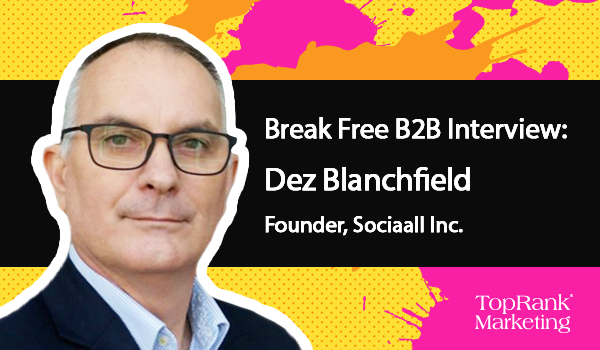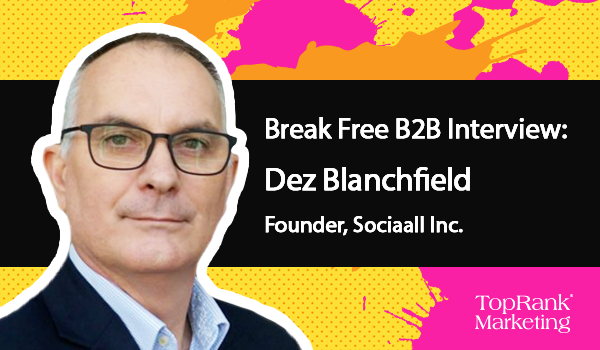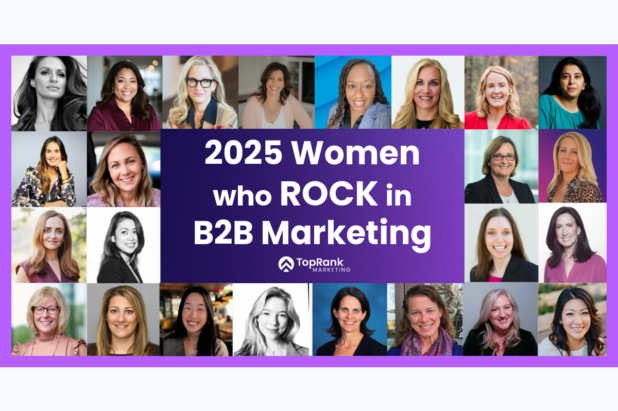
When it comes to B2B influencer marketing, it’s natural to wonder just what an industry influencer actually looks like?
Our third season of Break Free B2B Marketing video interviews feature conversations with top B2B influencers, looking closely at the issues that each expert is influential about in their industry.
For more than a decade our team at TopRank Marketing has fostered a strong community of leading influencers, developing close relationships with subject matter experts in many industries.
Running a successful business is the art of juggling a thousand different things in a thousand different ways. It can be challenging to know which of these things to truly focus on and which balls are okay to drop for the sake of company growth. With so many new technologies at the forefront: cloud, machine learning, IoT, big data, virtualization, cybersecurity, and dozens of others – how do you know where to focus? How do you know which business best practices are the right one for your company vs. others?
There’s no catch-all answer to these questions, but there are industry experts who are more capable of answering them than anyone else. One of those experts is Dez Blanchfield. Dez has been in the business of digital transformation for over 25 years and has learned a lot from his robust experience working with IT leaders, solving complex problems, and running his own successful digital social agency, Sociaall Inc.
He’s here today in the latest episode of TopRank’s Break Free B2B marketing video series to share some of his invaluable insight.
Break Free B2B Interview with Dez Blanchfield
If you’re interested in checking out a particular portion of the discussion, you can find a quick general outline below, as well as a few excerpts that stood out to us.
- 1:00 – Introduction to Dez
- 2:03 – Is it a good idea to be a jack of all trades?
- 5:31 – Is the pace of change accelerating?
- 11:25 – Are business changes made due to the Covid-19 pandemic going to stick?
- 20:00 – For the B2B marketing audience: where are things headed in the near future?
- 40:20 – B2B influencer marketing
- 47:11 – It’s not about the number of followers, but the number of people you can move
- 53:24 – Tracking and monitoring development from B2C to B2B
- 56:10 – Where can you find Dez to hear more?
Josh: It seems like you’re looking to where the puck is going to be versus where the puck is now and have your entire career. So in a very general sense for our B2B marketing audience: where’s the puck going? If you’re a B2B business person and leader and executive, where should you be looking just for the near future?
Dez: The advice I’ve been giving people in the last three to five years is that it was a time when you could do it all yourself. If you were an airline, or a bank, or if you were in health care, or wealth management, if you’re a telco, there was a time when you could do it all, you could run your own telephone systems, run your own technology, stack your own email servers, your own domain name servers. But the complexity is so great now and the speed at which we have to move, as you alluded to before, is so rapid, and so short, and you know that the demand is for reduced time to market. The advice I’m giving people now is: find the best partner choice. In each of the segments, you need to be able to address problems. So if you’re a bank, be a bank, focus on being the best bank, you can, and look for things that are gonna disrupt you. But don’t try to be a phone company. Don’t run your own PBX, don’t run your voice systems. If you own a website, don’t become a hosting company. Don’t waste your time running web services.
“If you're a bank, be a bank, focus on being the best bank you can, and look for things that are going to disrupt you. But don't try to be a phone company.” — Dez Blanchfield @dez_blanchfield #BreakFreeB2B Share on XJosh: No, and it seems like the pandemic, which you mentioned there, is almost an accelerant more than anything. We were thinking of it as a slow down and shut down and lockdown. But really, it seems to have just taken all of these very cautious steps that businesses would have would have taken and made them suddenly have to run forward with it. Do you think these are changes that are going to stick? Or are we going to have this inertia pulling us back to normal?
Dez: The way I like to describe it is: if I was in a boardroom the other day having to whiteboard this out, and I would describe it as we’ve already jumped off this cliff. And if you’ve ever jumped off a cliff, you know, it’s impossible to get back up there without actually landing somewhere and then walking a long way back to the track to get to the top. So we have, without wanting to, had to jump off this cliff and deal with it.
I think the majority of the impact is not going to reverse. We are definitely going to want to sit in cafes and go to restaurants again. But the way in which we interact with those will change. So for example, I have an app now for my local barista and I just ordered my cappuccino and wandered past and picked it up at a window. I don’t wait for 15 minutes in a queue in a stuffy room waiting for my coffee to turn up. So you know those use cases have already changed. And retailers have had to go online when they’ve never been online. They’ve had to get apps or integrate and leverage things, shift to digital payments and move away from cash. All these changes have happened. Even with the worst possible human apathy, where humans are lazy, and very arrogant. And you know when we think of them, when we think of some of the changes that have happened the last couple of decades. They’ve come about and people become lazy and there’s been high level apathy and they go back to the normal ways.
Keep your eye on the TopRank Marketing Blog and subscribe to our YouTube channel for more Break Free B2B interviews. Also check out episodes from season 1 and season 2.
Take your B2B marketing to new heights by checking out out previous season 3 episodes of Break Free B2B Marketing:
- Episode 1: Kevin L. Jackson, GC GlobalNet — The Future of Cloud Computing
- Episode 2: Tim Crawford, AVOA — The New Normal
- Episode 3: Oliver Christie, PertexaHealthTech — The Future of Artificial Intelligence
- Episode 4: Liam McIvor Martin, Time Doctor — Trends in Remote Work
- Episode 5: Sarah Barnes-Humphrey, SHIPZ — The Future of Supply Chain
- Episode 6: Eric Vanberburg, TCDI — The Changing Cybersecurity Landscape
- Episode 7: Nicole Brady, SAHM Reviews — The Importance of Empathy
- Episode 8: Tamara McCleary, Thulium — Visions of the Future



